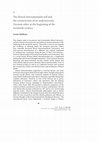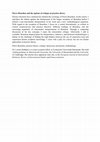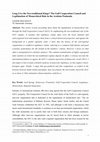Papers by Leonie Holthaus
Theory as Ideology in International Relations

New Perspectives
In this essay, we consider the role of academics as change-makers. There is a long line of reflec... more In this essay, we consider the role of academics as change-makers. There is a long line of reflection about academics’ sociopolitical role(s) in international relations (IR). Yet, our attempt differs from available considerations in two regards. First, we emphasize that academics are not a homogenous group. While some keep their distance from policymakers, others frequently provide policy advice. Hence, positions and possibilities of influence differ. Second, our argument is not oriented towards the past but the future. That is, we develop our reflections on academics as change-makers by outlining the vision of a ‘FutureLab’, an innovative, future forum that brings together different world-makers who are united in their attempt to improve ‘the world'. Our vision accounts for current, perhaps alarming trends in academia, such as debates about the (in)ability to confront post-truth politics. Still, it is a (critically) optimistic one and can be read as an invitation for experiment...
Politische Vierteljahresschrift

Zeitschrift für Internationale Beziehungen
Die Soziologie von Pierre Bourdieu wird in der Praxistheorie vielfach diskutiert. Dieser Beitrag ... more Die Soziologie von Pierre Bourdieu wird in der Praxistheorie vielfach diskutiert. Dieser Beitrag stellt die Debatte zunächst vor dem Hintergrund der länger währenden Rezeption von Bourdieus Soziologie in der Disziplin der Internationalen Beziehungen (IB) vor, bevor er eine nicht-strukturalistische Interpretation von Bourdieus Soziologie verteidigt und für kritische, aber nicht zu distanzierte Studien plädiert. Mit Blick auf die Bourdieu-Rezeption wird gezeigt, dass Bourdieu zunächst kritische Perspektiven in der IB inspirierte, bevor er zum vielzitierten Referenztheoretiker der mainstreamtauglichen Anteile der Praxistheorie wurde. Auch wenn die Vereinnahmung des kritischen Soziologen hier Widerstand hervorruft, unterstellen praxistheoretische KritikerInnen Bourdieu dennoch, (wieder) zunehmend erfolgreich eine Soziologie der sozialen Reproduktion vorgelegt zu haben, welche die empirische Forschung kaum bereichert. Durch eine konkurrierende Diskussion seiner Terminologie versucht dies...

VOLUNTAS: International Journal of Voluntary and Nonprofit Organizations
This article examines the widely held assumption that Germany’s political foundations pursue dist... more This article examines the widely held assumption that Germany’s political foundations pursue distinctively partisan approaches that promise to be advantageous with regard to the furtherance of pluralist civil societies abroad. It reviews this assumption through a qualitative analysis of their partnerships in transitional Tunisia, following a comparison between the German foundations and other Western agencies. It exposes a common secular bias in Western civil society support and qualifies the assumption that the partisan approaches lead easily to pluralist civil society support. While the foundations partner with rather diverse organizations, they still favor organizations that follow Western lines, and their civil society support practices display interest in the furtherance of both pluralism and democratic-stability promising corporatism.

European Journal of International Relations
Welfare internationalism was and still is one of the most powerful justifications for establishin... more Welfare internationalism was and still is one of the most powerful justifications for establishing international organizations. It suggests that public international organizations should cater to the material needs of individuals, rather than solve conflicts among states. In this article, we trace the origins of welfare internationalism, challenging the dominant narrative that depicts it as a projection of the British welfare state or the American New Deal to the globe. We show that welfare internationalism emerged earlier and combined ideational elements of very different origins. Notions of professional colonial administration migrated to the international context and dovetailed with a cosmopolitan interpretation of 19th-century public unions as caretakers of citizen interests. Reform socialist approaches to the social question inspired domestic and international developments simultaneously, leading to the foundation of the International Labour Organization, which became a crucial...
Reihe 31: Politikwissenschaft / Series 31: Political Science / Série 31: Sciences politiques, 2010
Page 1. Europäische Hochschulschriften Leonie Holthaus Regimelegitimität und regionale Kooperatio... more Page 1. Europäische Hochschulschriften Leonie Holthaus Regimelegitimität und regionale Kooperation im Golf-Kooperationsrat (Gulf Cooperation Council) PETER LANG Page 2. Page 3. Regimelegitimität und regionale Kooperation ...
Regionale Integration, 2015
Radicals and Reactionaries in Twentieth-Century International Thought, 2015
Zeitgenössische Demokratietheorie, 2012
Zeitgenössische Demokratietheorie, 2012

Practice theory has become a popular and avowedly pluralistic research programme in European and ... more Practice theory has become a popular and avowedly pluralistic research programme in European and Canadian international relations (IR). It promises the end of monolithic grand theorising and armchair analysis. Yet, taken together, practice theory's pluralist character and methodological promises raise the question: who practises practice theory (and how)? I deal with this question through a discussion of three different, representative, and sociologically important books. On this basis, I depict three (ideal-)types of authorship. They include the (meta-)theorist, the scholar-practitioner, and the Bourdieusian researcher. I show that authors remake practice theory's theoretical claims by relating practice to theory in different manners, such as deep theorising, reworking of experience in inductive theorising, and reflexive conceptualisation. I focus less on the enduring position of (meta-)theorists. I rather argue that the different academic practices indicate that the authors seek prestige within practice theory and neighboring scientific communities. For this purpose, I approach prestige as durable esteem due to occupational achievements. Finally, I ask how the new scientific demands of practice theory might impact young, less established academics.

In this chapter, we investigate the activities of scholar-practitioners in the trading zones betw... more In this chapter, we investigate the activities of scholar-practitioners in the trading zones between theory and practice of international relations. These trading zones are the place where ‘ideologies of international organisation’ take shape, understood as recognisable and recurring patterns of justificatory arguments that define the scope and competences of an international organisation, relating them to a set of political goals and values depicted as universal and largely uncontroversial. Drawing on the seminal work of Robert W. Cox, we are particularly interested in the way in which such ideologies serve the interests of international organisations and their exponents. Scholar-practitioners were in a prominent position to shape common understandings of what international organisations were and what they were good for. They addressed diverse audiences including not only civil servants and member state representatives but also donors, civil society groups and not least the scholarly community in the field of political sciences and law. We illustrate our theoretical argument by introducing three scholar-practitioners from the early and mid-twentieth century who tried to anchor social-democratic values and strategies in international organisations: James T. Shotwell, David Mitrany and C. Wilfred Jenks.

This chapter seeks to reconstruct and contextualise liberal internationalism’s creation of an aut... more This chapter seeks to reconstruct and contextualise liberal internationalism’s creation of an autocratic and militarist German adversary at the beginning of the twentieth century. Therewith, it turns to one example per excellence for othering within the European spectrum. Others have seminally discussed liberal internationalism’s Eurocentric and self-conscious discrimination of a different, less civilised, traditional, or undemocratic counterpart along the lines of West-East divisions (Hobson, 2012). However, liberal images of Germany have hardly received attention. This is a severe lacuna because liberal internationalism has a complicated relationship with German thought and politics. When tensions between liberalism and democratization became evident within Britain and when British imperial power declined, liberal internationalist views of less civilised societies as well as of a militarist German state involved the accentuation of their own British virtues and recollection of liberal beliefs.

Practice theorists have exhaustively debated the sociology of Pierre Bourdieu. In this article, I... more Practice theorists have exhaustively debated the sociology of Pierre Bourdieu. In this article, I introduce the debate against the background of the longer reception of Bourdieu before I defend a non-structuralist interpretation of his work and a new, methodological argument. With regard to the reception of Bourdieu, I focus on a central discontinuity, as evident in critical constructivists and practice theorists' different readings of Bourdieu, and the increasing popularity of structuralist interpretations of Bourdieu. Through a competing discussion of his key concepts, I reject the structuralist critique. Afterwards, I add to available, Bourdieu-inspired pleas for interpretative, inductive, and historical methodologies a debate on the challenge of finding the right balance between the use of experience-near and experience-distant academic knowledge. I close with a plea for critical, but not too distant approaches in practice theory. Pierre Bourdieu; practice theory; critique; democracy promotion; methodology Dr. Leonie Holthaus is a senior research fellow at Technische Universität Darmstadt. She held visiting positions at Aberystwyth University, the University of Queensland and the University of Cambridge. Her articles have appeared, inter alia, in the European Journal of International Relations, Review of International Studies and Democratization.

This article revisits prevailing ideas about the legitimation of monarchical rule through the Gul... more This article revisits prevailing ideas about the legitimation of monarchical rule through the Gulf Cooperation Council (GCC) by emphasizing the neo-traditional rule of the GCC regimes. It assumes that legitimacy claims often cross the local, national and (sub-)regional level and analyzes them from a critical historical perspective and against the background of a global capitalist order. I show that the history of the sub-regional organization is wedded to legitimacy claims, referring to a common Gulf identity and good economic performance for the benefit of the members’ citizens. However, I focus on what often is marginalized in scholarly analyses: The common normalization of highly segregated labor markets on which the neo-traditional regimes depend. In effect, I criticize not only the international failures to oppose the GCC’s common repression of democratic revolt (2011). I also depict a bias in many scholarly analyses of autocratic legitimacy, as they neglect citizen-foreigner gaps. Finally, I argue that geo-political and elite competition, as evident in the tensions between Saudi Arabia and Qatar, does not prepare the unrevisable end of the GCC as we know it. Only substantive democratization could do so.
Uploads
Papers by Leonie Holthaus